|
|
|
|
|
Dick
Prall
|
|
|
|
A
small town boy with big city mentality,
Dick Prall embodies the role of
a modern independent musician. Deciding
to forgo a more comfortable lifestyle
to follow his desire to write and
perform his own creations, Prall's
music and voice are both unique
and comforting. Way
Cool Music sat down with Prall to
discuss the joys and disappointments
of the recording process, the importance
of allowing space in a song and
his future as a working musician.
|
|
|
|
|
WC:
|
Tell
us a little about your background.
|
|
|
|
|
Dick
Prall:
|
I
was born in Hannibal, Missouri and
my family ended up in Mason City,
Iowa. My father passed away when
I was a little kid. My mom got remarried
so the family moved to a very small
town called, Sheffield, Iowa. It's
in north central Iowa; it's about
1000 people now. I didn't do music
when I was a kid except for singing
in the choir, or chorus as it was
called. But, I was kicked out of
that for being a smart ass. Then,
I moved away to Denver, Colorado.
I didn't know what I wanted to do.
I always fantasized about being
a musician, but I wasn't. I couldn't
play anything...I never sang in
a band. I started dabbling with
a few musicians out there, learning
covers in a basement, hanging out.
I decided I really wanted to be
a musician. I didn't know if I wanted
to do music or act. But, music was
always something I fantasized about
as a kid...not acting so much...it always intrigued me.
|
|
|
|
When
I was in Denver, I started writing
some songs. Just melodies because
I still couldn't play. I got together
with a friend who was a guitar player
and cut a demo. it's a 5-song demo
on a cassette player. it's tucked
away and I still have it. The songs
had names like, 'don't Cry (I'll
Call You In The Morning)', and 'Real
Life America' which was a heart-felt
song about the travesties that go
on in our nation. (smirking) They centered
around small-town life. I wrote
a love song...an amazing piece
of work called, 'Fall Into Your
Soul.' (laughing) They were all
so wonderfully horrific.
|
|
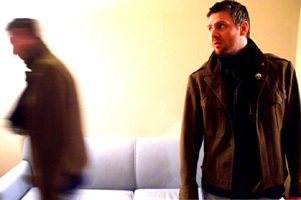
|
|
|
|
|
|
WC:
|
Why
has that song not appeared on any
record?
|
|
|
|
|
DP:
|
The
gems I like to keep to myself. So,
I did that whole thing with my buddy.
It was cool, but I didn't get the
idea across as to exactly how I
wanted to do it because I didn't
play guitar. So, I moved to Cedar
Rapids, Iowa and started getting
involved in local bands. I was in
a band called, Bomb Pop. Every city
in the nation has a band called
Bomb Pop, I discovered. One of these
guys was in another band called
Baggy Spandex. We started playing
a few songs that he had written
and started writing together. His
name is Quentin Duarte. Quentin
was insane, and
extremely bipolar, but had a brilliant
mind and was this tremendously original
writer. He was a little
guy who looked a little like Flea
(Red Hot Chili Peppers). When I
first met Quentin, he was small,
but lean and muscular. When I started
playing with him, he had a gut.
But, he still played with his shirt
off like he used to when he was
lean. So, here I was playing in
this power punk band, me with my
little pop melodies. It kind of
worked. Quentin and I were socially
very different. I'm really chatty
and he is not...doesn't really
like people. But, we really hit
it off more than the rest of the
guys did. He introduced me to stuff
like The Buzzcocks and New York
Dolls. He got me into House of Large
Sizes, which is one of my favorite,
if not my favorite, live bands.
They are a good Iowa band.
I
told him I wanted to learn to play
guitar. We drove to Des Moines,
Iowa one day. I had $300 and I bought
a shitty Sigma Martin guitar. It
was like pushing down railroad ties
because the action was so high on
the strings. He circled chords in
a chord book and said, "This is
what you need to know to start with."
I taught myself how to play. He
played these new jazz things. To
this day, I can't play what he plays.
But, it was fun. I started writing
on the side. With the first four
chords I learned, I wrote a song
called, 'Turn Away.' Pretty much
everything that's on the first CD
is everything I had written. Bomb
Pop kind of stopped when I was writing
my own stuff. We had gotten a new
drummer, Bill Neff, who played with
House of Large Sizes for a while.
He also played in a band called,
The Bent Scepters...he's a pop guy.
He heard the stuff I was writing
and said, "You should be playing
this in Bomb Pop." But, it wasn't
really Bomb Pop's sound. My songs
were poppy and rootsy while Bomb
Pop was full - on punk. He said,
"Let's record this stuff." So, I
just started doing that. Eventually,
it became the Dick Prall Band with
me and Bill Neff and Eric Straumanis
playing bass and Brook Hoover who
was another insane guitar player
back home. There are a lot of phenomenal
musicians back home (Iowa), but
they don't have anything over their
heads like labels or competition
bullshit. They are just really good
at what they do. On the other side,
there is a lot of apathy and not
a lot of ambition I guess. that's
where I differed from those guys
because I was ambitious in the sense
that I wanted to challenge myself.
I wanted to be a better songwriter
and see how far I could go with
it.
|
|
|
|
|
|
| 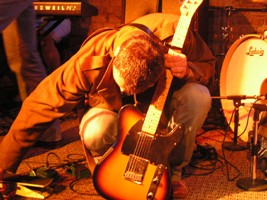
|
|
I
played in the Dick Prall Band, had
a revolving cast of a few musicians,
and then got married. I moved to
Chicago. And, that's when Starch
Martins started. I always hated
the name, Dick Prall Band, but the
guys in the band could never agree
what we should call ourselves. I
had this name, Starch Martins, for
a while. When I disbanded The Dick
Prall Band, I went to that. Dick
Prall is kind of an odd name, if
anyone hasn't noticed, so I wasn't
comfortable using that name. Growing
up with it was weird. I went through
a phase, in Denver, where I introduced
myself as Richard. But, I had so
much guilt calling myself that because
my father went by 'Dick' and that's
what he called me. Seemed
like I was disrespecting
my dad by not calling
myself what he wanted.
I went
by 'Richard' for a year, but couldn't
take it anymore. I said, "I'm really
Dick!"
|
|
|
|
|
|
|
I
got married and moved to Chicago.
I had written a batch of songs and
found a studio, Rax Trax, which
I really love, and recorded those
songs. My wife took a job here.
It was between Chicago and San Francisco,
but I'm deathly afraid of earthquakes
so we chose Chicago. And, that's
how I got to Chicago.
With
the Starch Martins album, I had
written a number of those songs
while I was separated and starting
a divorce. So, I wanted to take
those songs that were a little darker,
more introspective and throw them
against a canvas that was brighter
and more poppy. I was happy with
the album. I was horrified by the
mix. The whole landscape of an album
can change in someone else's hands
who has no idea the vision you were
going for to start with. that's
what happened with the Starch Martins
album. I'm proud of the songwriting
because it's a leap from where I
was before. But, it didn't come
off anywhere near what I had hoped
it would sound. We were a little
overindulgent being in a big studio
for the first time, using all the
bells and whistles. And, John Svec
who is a fucking incredible bass
player, and writes beautiful music,
took over the reigns on guitar.
I think we produced some really
cool shit together, but we went
overboard. It was kind of uncomfortable
for me once the album was done.
It was a much more Dick Prall/John
Svec album then it was a Dick Prall
thing. I didn't have as much ownership
of it as I wanted. But, that's how
it goes.
|
|
|
|
|
WC:
|
How
would you describe your current
sound to someone who's never heard
you before?
|
|
|
|
DP:
|
There's
the whole singer ö songwriter label
which, at one point, was all the
rage...the guy with his acoustic
guitar. I think that's always going
to continue with guys like David
Gray. But, now you have guys like
Damien Rice, Patrick Park, and Ryan
Adams who does whatever the hell
he wants which is cool. But, I don't
think of myself as the troubadour
with his guitar that does all of
these heart ö felt songs all stripped
down. There's an element of it that
I like, and a thread of that just
in the way I write with an acoustic.
But, there's a lot of shit that
I hear in my head, certain parts
that I like to hear that you just
don't get with an acoustic. I think
that with this album, I've finally
straddled the two things that I
love, which is a basic song with
little sonic threads that add to
the whole mood or soundscape of
the song. it's those elements that
make them more interesting and separate
the songs from the just being singer
ö songwriter material.
|
|
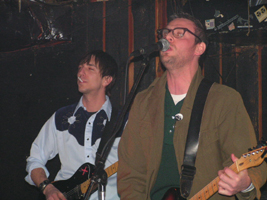
|
|
|
|
|
|
|
I
got to work with horns for the first
time. That was exciting because,
for example with the song, 'Great
Admirer,' I've heard that song in
my head for three years. I had always
heard it with horns, and with a
certain vibe. The horn players who
came in were awesome and great to
work with. I didn't have to chart
stuff out because I don't know how
to write music. I just hummed it
and we got it done.
I'm
really happy. I think the biggest
reason that I'm happy is not because,
"Jesus, I have this great album,"
but it's that I finally interpreted
something in enough of an articulate
manner that people understood it,
and we could put it to tape. It
wasn't just my ability, but working
with people like Brian McDonald,
who "got" it. He's someone I've
worked with for quite a while. From
us being friends for all these years,
regardless of what he's into, he
knows what I like to hear. that's
pretty rare. Instead of being slapped
with some studio musicians and me
saying, "This is what I want," and,
them saying, "Here's the tricks
of my trade." Brian had a lot of
time to foster the ideas that I
had and, actually, bring them to
life. Josh Shapera is the same way.
He engineered the album. I think
that was the best fit because he's
known me for a while. For years
now, we've talked about doing an
album together. He was my first
choice. In a short amount of time,
with a normal commercial studio
vibe, we walked in and really brought
to the table exactly what we wanted.
We got it delivered because Josh
understood from those conversations
we'd had in the past. We started
recording in October and by the
middle of January, we had it done.
Part of it is that I know more...I'm not as green. The first CD was
recorded in a basement in Iowa City.
For the second CD, we were in a
big studio and we thought, "I guess
we could put 62 tracks on this one
song." Seriously, it got to that
point where, when you are doing
that much, and you weed through
what you need and don't need, you
start squeezing these instruments
into little, tiny pockets of the
song. In the end, there's no space.
This
album (fizzlebuzzie)
has lots and lots of space. It breathes.
it's much truer to how we sound
live. When we first talked about
this, we were going to do more of
a live album...but, I didn't want
to do a live album. I wanted to
take those liberties of having a
headphone experience. it's a big
part of what I love. I'm a big fan
of The Beatles and Catherine Wheel.
Those bands that give us little
treats that you hear when you have
headphones on. You are not going
to necessarily hear when you are
blaring it through your stereo or
your car.
|
|
|
|
|
WC:
|
Describe
your songwriting process.
|
|
|
|
|
|
| 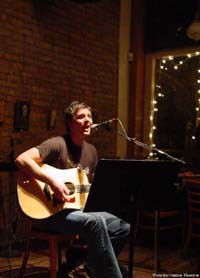
|
|
DP:
|
I
don't write a lot, to tell the truth.
It just kind of hits me. I'm not
the person who gets an idea at 2:00
am and I grab my guitar. I'm too
fucking lazy for that. Obviously,
when I get done with an album and
have some time with the songs that
I'm playing live, then I start to
jones to write new material. So,
I'm not constantly writing. What
I do, what I've always done, is
sit down with my acoustic. Hopefully
no one is home, or I go in the bathroom.
I'm very, very easily distracted
by TV and people...and shoestrings.
Probably, not unlike most musicians,
I pour myself a drink and see what
happens. If things fall out of my
head, great. If they don't, they
don't. I try not to get too flustered.
I don't know if I've ever sat down
and ripped off a whole song in one
sitting. I'm way too analytical
and way too critical to do that.
And, maybe that's bad, but it just
doesn't feel right to me. There
are times where I'll write one part
of a song, and months later something
will hit me and make me think, "Shit,
that'd work for that song." It's
specific to that song. I don't take
one part of one song and part of
another to fuse them together. I'll
get on one song and work on it for
a couple of days. If something doesn't
happen then I'll walk away.
|
|
|
WC:
|
What
comes first, the lyrics or melody?
|
|
|
|
|
DP:
|
They
come together. It's weird for me.
it's like...not to be Zen or anything,
but it happens. I think it's because
of the phrasing. If I'm writing
a chord and the melody's coming,
the words just come out because
they fit within the phrasing of
that chord progression. I really
don't know, necessarily, what I'm
writing about. But, the idea comes
fairly soon after I've thrown out
some of it and I work out the idea
of the song. I've never had the
title or idea of the song beforehand...it just doesn't happen like that
for me. I can't write without my
guitar. I have to hear it back.
|
|
|
|
|
WC:
|
Where
do you find the inspiration?
|
|
|
|
|
DP:
|
It
tends to be personal, but then there's
a lot of influence outside of myself.
It might be a story someone's told
me or problems or arguments. I do
write a lot of stuff from my personal
life. I'm not hugely political.
One song that turned out to be more
of a political or socially conscious
song is 'Copperhead Town' which
is basically about me being disgusted
by mainstream media, and how things
are being delivered. It's how all
of these pretty faces are telling
these horrible stories and they
are sound bites so you are not necessarily
getting the truth. You just don't
know what you are getting. And,
all of it being negative and that's
why you should stay away from Copperhead
Town. Be positive and get your information
from somewhere else.
|
|
|
|
|
I
write songs based on relationships,
but not necessarily relationships
between two people; relationships
that people have within society.
Like 'Saturday's Changed,' anyone
who has lived life beyond 21 can
get. Now I have responsibilities.
it's not about waking up hung over
and sitting around thinking about
what we are going to do tonight,
being baked or whatever you are
into. Things are not as easy or
carefree as it used to be. you've
got shit that has to get done. But,
part of that is your choice. The
first part of that song is about
the goofy things that, as kids,
used to trip you up. Like, for boys,
it was being in PE class and hearing,
"Today, we are wrestling." You are
thinking, "I'm weak! I can't do
it!" And, it turns out that it's
your best friend that you have to
wrestle. You want to feel competitive,
but you don't. Yet, he is more competitive
so he is going to beat you and you'll
feel even more like a douche bag because
you didn't kick his ass. And, having
to dance in junior high, but not
knowing how to dance or how to interact
with girls...it's all that shit.
The second part is about being an
adult. You are making this money,
but you're really not because it's
going toward the house and the car
and the kid's soccer practice, skiing,
all these lessons...all this shit
that doesn't mean a whole lot. Then,
it turns back into wishing you had
that summer when you just wanted
to be with that girl that you fell
in love with.
|
|
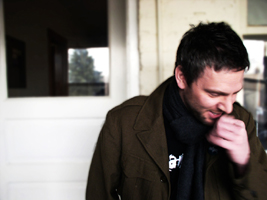
|
|
|
|
|
|
|
I'd
say there's a lot of nostalgia in
this album because I, personally,
miss a lot of that stuff. Not just
my youth. I find myself saying,
"Kids these days don't have what
we have. They've got too much, but
they don't appreciate it." But,
I also don't let go of the new stuff.
They're
saying that the music industry is
in trouble. And, I think it's because
there's not a lot of genuine stuff
on the radio. The funny thing is
for those people who listen to mainstream
shit, you play The Shins for them
and they say, "This is really fucking
good! Why isn't this on the radio?"
I think, "Why isn't this on the
radio?" The industry isn't run by
music people. that's not whining
or bitching. I truly believe that
it does suck. It is the lowest common
denominator, which, I think, is
a real kick in the crotch to the
public. We are assuming that all
listeners are the lowest common
denominator and this is all they
are really going to understand,
and the weirdoes and indie people
will find their own music. that's
bullshit. They've done a great job
of segregating all of these people,
which is stupid. I remember reading
an article...a black artist from
the '70s who said, "We just used
to call it rock & roll." Whether
it was Simon & Garfunkel or
The Beatles or Black Sabbath or
Jimi Hendrix...it was all just
rock. It all shared the airwaves.
Now, everything is categorized so
you can wear your music like you
wear your shirt. that's sad. I'm
no different from anyone else; I
like a lot of different stuff.
|
|
|
|
|
WC:
|
it's
been four years since the last album,
what was the delay?
|
|
|
|
|
DP:
|
Money.
Money for the first couple of years.
After that, I was disgusted with
the way things were going for me
at the time. Mad, in selfish way,
that things weren't going the way
we had hoped or the way so many
people had said they were going
to. I kind of stopped writing and
thinking, "What's the point?" Prior
to this year of writing and working
on this album, that third year was
about saying, "Fuck it. I don't
want to do it." When I disbanded
Starch Martins, I didn't have to
worry about being cool or getting
on this tour, or anybody watching
what I was doing, I started writing
for myself. I'd always written for
myself, but this time there were
no expectations. During the first
album, I wanted to share the songs.
The second album was like, "I've
got one album so I've got to have
a second album." Critically, it
was really well received, but where's
the stardom, where's the fame, where's
the radio? I had gone through that
metamorphosis and realized it's
not there. I can go back to sitting
on my couch, playing songs that
appealed to me. it's almost like
it was when I was first writing.
Not trying to impress anybody but
myself. Now I think I'm a far better
songwriter, hopefully, than when
I was writing the Dick Prall Band
stuff. I know a lot more and I'm
more comfortable with what I do.
I can get the songs out that I want
instead of struggling to find the
right chord or progression.
|
|
|
|
|
WC:
|
Tell
us about the new CD.
|
|
|
|
|
|
| 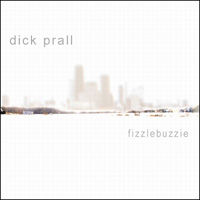
|
|
DP:
|
What
it means to me is that it's the
first time that I've gotten what's
in my head out on tape. that's an
awesome feeling. No bullshit, I've
only listened to the entire Starch
Martins album twice. I've listened to the new one three
times, and not like, "Oh, I love
myself." it's like when you build
a new house, you keep driving around
it. that's what its like for me.
it's not just because it's simpler...it just is so much of an extension
of who I am and what I think that
an album, that I want to listen
to, sounds like. Good, bad, ugly
or tremendous, it doesn't matter.
Obviously, I put them out on CD
format and package them because
I want to sell them. But, I don't
feel pressured into selling a bunch
of albums.
|
|
|
|
|
|
|
So,
I was kind of moved when I first
heard it. Wow, we did this. Obviously,
it wasn't me alone. Brian (McDonald)
got it and brought important things
to the table. Greg (Miller) is a
tremendous drummer who threw the
exact right vibe, didn't overplay
it, didn't underplay it, and gave
it what it needed. Sarah (Ferguson)
has a beautiful voice and adds great
textures on keys. Paul (Stebner)
had a lot to fill because he is
a tremendous lead guitar player
and there are not a lot of leads
on this album. Josh (Shapera) was
the right person to bring it to
in order to get this thing that
was conceived. The mixing process
was really fun because there were
a lot of things that we tracked
that we stripped away as opposed
to jamming the space. that's more
for us. First and foremost, I want
to be a listener first and musician
second. Because, as a listener,
you are only going to put on what
is going to drive the idea home.
If you get all musician-y, you are
going to throw in a bunch of gratuitous
shit that doesn't need to be there,
that's more of an assault. Listeners
don't appreciate it, and don't even
get it. But, it eats up frequency.
If you know how the human ear works,
you eat up all this frequency; people
don't really grasp what you are
doing. There is a lot of space and
air on this album. That was kind
of hard for me to get used to at
first because you assume that you
need to do more than you really
need to. Josh really supported the
idea that you can get away with
less. There are little guitar things
that Brian did that last a few seconds,
but doesn't happen again. To me,
hopefully, the melody is the hook.
Hopefully, how and what I am singing
delivers the idea of the song and
it doesn't become repetitive.
|
|
|
|
|
WC:
|
Tell
us about 'Grand Marquee.'
|
|
|
|
|
DP:
|
I
think it will be misconstrued as
a dis to modern radio. It wasn't,
necessarily, about modern radio,
but it was about things that I missed.
I don't listen to a lot of radio
so maybe there are songs on there
that would give me the same feelings,
but I don't have a chance to listen.
The whole song is about a grand
marquee or a venue where many of
the greats have played. To me, there
are a lot of subpar artists that
are getting to play there as well.
I was thinking, "Wow, Britney Spears
has played the same place that Elvis
Costello has played." Thinking of
removing the letters to put up Britney's
name, and that this girl has no
right to share the same stage that
Elvis Costello has graced. that's
a personal dig, and it might offend
some people, but that's how I look
at it. Like I said, I don't listen
to music that much anymore. But,
it's a huge thing that I really
miss. Sitting back with my headphones
in a rocking chair, closing my eyes
and fantasizing that I am that artist.
I'm Paul Westerberg singing anything
off of 'Tim' or 'Pleased To Meet
Me' rocking my balls off on stage.
For me, it's how I look at music.
|
|
|
|
|
WC:
|
you've
done a lot of touring in 2002 and
2003. Tell us about life on the
road.
|
|
|
|
| DP:
|
For
a band at our level, it's a lot
of fun when the people you are with
are fun people who are relaxed.
When it is what it is, and no one
has visions of it being anything
more than a bunch of smelly people
in a van with not enough room or
money or food. That can be really
fun, but also can really suck. There
are points when you can get disgusted
with it. When all you want is to
be home with the people that you
love and the places that are comfortable
to you...get a good night's sleep.
So much of the drinking and partying
was, for me, self-medication. I'm
going to sleep on someone's floor
tonight. We just played for 30 people.
I'm tired and I'm just going to
get drunk.
It wasn't always like that, that's
the worst of it. The best is playing
for 30 people who are cool as hell,
and they have a party afterwards
so you meet folks. They are into
your stuff. They say, "I'm going
to tell my friends. Next time you
come back, we'll get you on the
college radio station, etc." The
support for you, as a nobody, can
be really cool. To me, it was more
of the good stuff than the shitty
stuff. Like anything, towards the
end, it got shittier because it
was ending.
|
|
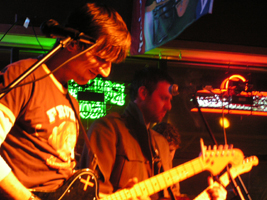
|
|
|
|
|
|
|
Playing
with Glen Phillips (former Toad
the Wet Sprocket) for the first
time was a great experience. We
are in this gigantic room together.
He and Steve (manager) were on their
computers and I just sat there.
Glen was really nice, making small
talk. But, I'm really bad with that
and get more nervous. So, I grabbed
my guitar and walked way in the
corner and started playing, not
so anyone could hear me, just to
warm up. When I was going on, Glen
walked with me and asked if he could
introduce me. I said, "that's up
to you. Whatever you want." He said,
"I'd be happy to." He walks out
and people start cheering, and I'm
thinking, "Wow, I'm going to be
playing with Glen Phillips." He
said, "How's everybody doing tonight?
I wanted to introduce this artist
named Dick Prall. I know absolutely
nothing about him. I just picked
him up today at the airport. He
seems like a very nice gentleman.
I just heard him warming up. He
has a beautiful voice and the songs
I heard are really good and I think
you'll really like them. Here's
Dick Prall." The audience was really
welcoming because he helped me get
them. I had a great show. He was
on the side yelling goofy shit at
me. We really hit it off. We always
have fun together. I like him as
a person regardless of what he does.
I think Glen is comfortable around
me. We've shared hotel rooms and
I've dragged him out late at night
in a drunken stupor. I've made him
eat Fritos and french onion dip...shit that he normally wouldn't
be a part
of. And, he had a really good time
with it. He's been very gracious
in letting me continue to play with
him. it's been very cool...he's
a sweetheart.
|
|
|
|
|
WC:
|
What
has been your biggest rock star
moment?
|
|
|
|
|
DP:
|
My
first was meeting Slim Dunlap, from
the Replacements, which was awesome.
This was in the Turf Room in Minneapolis
when we were the Dick Prall Band.
We pull up in our old brown van
in the alley behind the club. I'm
just jumping out of the van, and
I hear, "Is that a Dick Prall?"
I walk behind the van to see this
skinny guy, slightly hunched over
and it's Slim Dunlap. He's says,
"Are you Dick? I've listened to
your album. It's really good stuff.
Do you need help unloading?" I'm
like, "Do all of the really great
Minneapolis bands unload each other's
shit?" I'm waiting for Westerberg
to come around the corner with an
ice cream cone! So, (Slim) helped
us unload. His band played mostly
Beatles covers, and it was just
a big party.
The
second one was meeting Ken Coomer,
from Wilco, and having him play
on the album (Starch Martins). He's
a sweetheart. I'm a big fan. I've
become friends with Kenny. Whenever
we are in Nashville, he has us come
stay at his house so we go and take
it over, try not to torment his
bird.
|
|
|
|
|
|
| 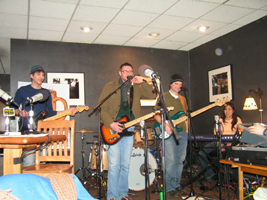
|
|
The
most powerful moment was opening
for Michelle Branch. We played a
festival with 7,000 people just
sitting on their butts waiting for
Michelle. One band had just gotten
done playing their 1 ¸ hour set
and people just sat on their blankets.
We got up and started playing. Three
songs into it, everybody was up,
jammed up against the barricade,
yelling and screaming. It was powerful
because people reacted. We started
playing better and getting into
it; we all fed off of each other.
I did this total rock star move
just to do it. I walk over to stage
right, take my hand and raise it
up so that whole side of the crowd
starts yelling. I run over to the
other side and did the same. I turned
around to see Chooch (bassist) and
he's just shaking his head like
I was a moron. It was awesome to
feel that reaction. Afterwards,
the cops had to shut down our merch
booth because of the line of people
who were buying our CDs and wanting
autographs. To have that reaction
when the next person up is why they
are there. I remember saying to
the band, "How'd you like that?
don't get used to it because tomorrow
we'll be playing for 10 ö 15 people
in Dubuque or Rock Island." And,
sure enough, a couple days later,
were in Rock Island for a handful
of people. I think that's when it
started for the band thinking, "Wait
a minute. We just did this huge
thing. Why not more?" I think if
we'd gotten on a big tour, and got
the exposure, things would have
been different. But, that's what
you say when things
didn't turn out your
way, right?
|
|
|
|
|
|
WC:
|
As
an independent artist, what keeps
you motivated to continue to make
good music and play shows when you
aren't booking those shows opening
for 7,000 people?
|
|
|
|
|
DP:
|
The
most important thing to me is the
writing side of it. Just because
I want to see what I can do with
my voice and what kind of melodies
I can come up with. I try to be
as original as I possibly can be.
don't misunderstand...I like playing
in front of people, but I like writing
a lot more. I like playing in front
of people when you get that feeling
that you are reliving how you felt
when you wrote it. Anybody who says
they do that each and every time
is full of shit because you don't.
When you dial it in, and I'm guilty
of that myself, it's work. So, I
love the writing side. I like the
studio and towards the end. That
big, fucking middle part, I hate
because you have no idea what it
is going to sound like. What makes
me do it is wanting to write a better
song than the last one I wrote.
I
was listening to an interview on
NPR, no one famous, that was talking
about writing music. They were talking
about if people have exhausted original
music. This guy was saying, "Oh
yeah. There are only so many chords..."
That's fucking bullshit! I'm driving
through downtown Chicago looking
at all these amazing buildings that
each has their own vibes. So many
are made with the same bricks, the
same color, but they are all their
own building. So, chords are the
same bricks, but you build your
own thing. Once your voice is on
it, and you pour your heart and
soul into it....not to be cliche...you give yourself to that song,
it's yours. It doesn't matter if
so and so used those three chords
and verse...no shit! But, that
melody wasn't on it and those lyrics
weren't on it. I'm sure some things
I do are more similar to someone
else, and some things are, hopefully,
completely original.
|
|
|
|
|
WC:
|
What
are some of your favorite venues?
|
|
|
|
DP:
|
Schubas
(Chicago) is great. it's got a great
sound system. The sound guys are
tremendous. it's comfortable and
has a great vibe. I love Gabe's
Oasis (Iowa City) because it's a
full on rock club. The Hurricane
(Kansas City) has a great stage,
great sound people...Stan (owner)
is awesome. He's very kind and very
supportive. I like Uncommon Ground
(Chicago). You can try new stuff
on the acoustic and see how it turns
out. My favorite place to play is
the Surf Ballroom (Iowa) because
I'm a huge Buddy Holly fan, and
it's been a dream of mine since
I was a kid. We played there and,
hopefully, will play there again.
Schubas is home.
|
|
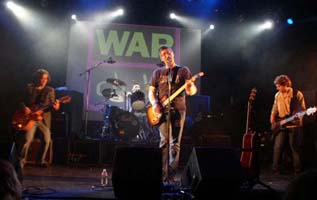
|
|
|
|
|
|
WC:
|
What
is your opinion of the Chicago music
scene?
|
|
|
|
|
DP:
|
Disjointed,
fragmented, not a lot of camaraderie.
I don't think the community itself
is coming together. I don't think
that's a part of Chicago, as a whole.
I think it's because it's the Midwest...it's a Midwest vibe to be more laid
back. You don't feel very compelled
to put this scene together. I think
there are people who would like
to see that. I'd like to see it,
but Chicago is a big city. New York's
small and congested and LA is sprawling.
But, I do love Largo (LA). I hope
to get to play there again and,
then, I'd probably call that one
of my favorite places. Opening for
Jon Brion was another huge rock
star moment. Flanny (owner) asked
me to open for Jon after he saw
me open for Glen (Phillips)...that
was stellar.
I
think there are a lot of really
good bands in Chicago. I think people
talk too fucking much at shows.
I don't see that in New York, or
down south or, especially, at Largo.
People need to shut the fuck up.
If you are going to see Glen Phillips
play acoustic, why are you going
to talk? Instead, go to a bar, or
the bar area in the same venue,
get the shit out of your head and
then come back. that's infuriating
and disrespectful...not just to
the performer, but to the listener.
I went to the Abbey Pub (Chicago)
to see one of my heroes, Grant Lee
Phillips, and I left. It was either
leave or punch someone out.
|
|
|
|
|
WC:
|
Where
do you see yourself in five years?
|
|
|
|
|
DP:
|
that's
the question that all employers
like to ask. "Hopefully, not working
for you," is what I'm
thinking. Just being a better songwriter.
Ideally, making a living off of
strictly being an artist. Providing
for my daughter and girlfriend.
Just having a comfortable existence
as a musician. Five years from now,
I'll probably be working and writing
music, maybe two or three more albums.
|
|
|
|
|
WC:
|
What
other music are you listening to?
|
|
|
|
|
DP:
|
The
Shins. I'm a huge Rufus Wainwright
fan. I bought Poses years ago
and love that album. Melodically,
it's beautiful...that voice. Josh
Rouse, to me, is the real deal.
I'd love to play with him. He's
a phenomenal songwriter. Bobby Bare,
Jr's Young Criminal Starvation
League is great stuff. I get these
compilations from my friend, Kevin
from Colorado. It's always
great stuff, but I don't know the
names. There is a shitload of new music
out there that is great, but not
on the radio. Hopefully, the
Internet and XM radio will start
paying back these artists.
|
|
|
|
|
WC:
|
How
do you spend your time outside of
music?
|
|
|
|
|
DP:
|
I
love being with my daughter, Elizabeth
Rose. Playing with her, seeing her
grow up, watching her intellect
grow and expand. I love sitting
on my couch with my girlfriend watching
movies and passing out after work.
I love what I do for work. I like
what it is. I love hanging out with
my friends, having some cocktails
and shooting the shit. Outside of
being with Elizabeth and Angella,
that's what I love to do. If I don't
do that, I get really agitated.
Those are the things I like to do.
|
|
|
|
|
|

|
|
|
|
|
What's the worst job
you've ever had? it's
sad, I don't
think I've had
a job I absolutely
hated because
I ended up liking
who I was working
with. I've fabricated
steel. I've
cut meat. I've
reviewed loans
for a bank...that's scary
that I've got
your mortgage
in my hands.
I like the menial
stuff. I write
a lot of material
when I'm just
going through
the motions.
I'd say the
worst job I've
had, which really
wasn't that
bad, was detassling
corn.
|
|
|
|
|
|
What's your favorite
movie quote or song lyric? "One
foot in the
door/The other
foot in the
gutter." It's
from Paul Westerberg's
(The Replacements)
'I Don't Know."
|
|
|
|
|
|
Who would you want to
star in the movie of your life? Carrot
Top
|
|
|
|
|
|
What's your favorite TV
theme song? Greatest
American Hero
|
|
|
|
|
|
If you were a
superhero, what would your name be?
Spiderman...I want to be
Spiderman. No
other superhero
matters to me.
I'll be Spiderdick
if I have to
choose a name.
|
|
|
|
|
|
What do you want to be
when you grow up? Eastern
European
|
|
|
|
|
|
Finally, why are there
so many songs about rainbows?
Apparently,
I've been listening
to anti-rainbow
songs because
I didn't know
that there were
that many songs
about rainbows.
Maybe there
are songs about
rainbows because
people need
something that
rhymes with
"flamethrows."
|
|
|
|
|
To find out more information about Dick
Prall, visit his website at www.dickprall.com.
|
|
|
|
|
|
|
|